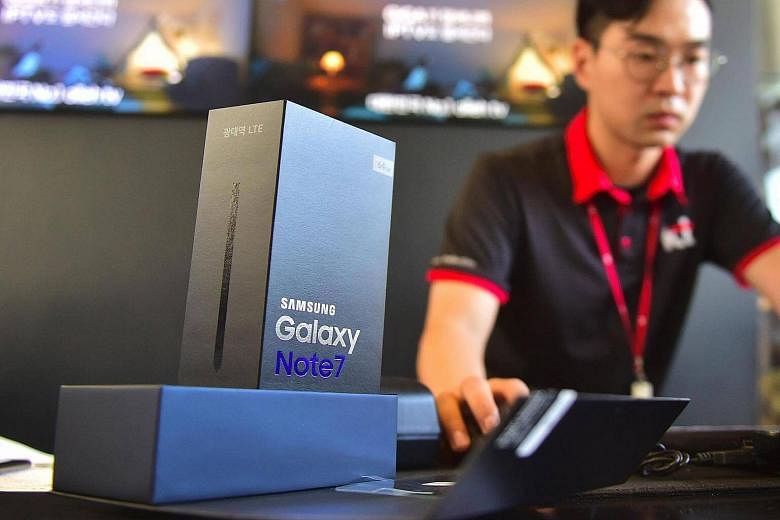Samsung Electronics on Monday (Jan 23) said irregularly-sized batteries in its premium Galaxy Note7 phones caused the devices to catch fire.
This came more than three months after the leading smartphone maker lost about US$5.3 billion (S$7.53 billion) from the recall of the phones.
Reports of the phones exploding in countries including South Korea, China and the United States had marred the electronics giant's image as it struggled to retain customers.
Here is a look at what happened.
Aug 2, 2016
The Note7 is unveiled in the United States to rave reviews, with a host of features including iris-scanning technology, a 64-bit octa-core (2.3GHz quad-core and 1.6GHz quad-core) processor and 4GB of system memory.
Aug 20, 2016
Samsung launches the S$1,168 Note7 in Singapore.
Sept 1, 2016
Samsung said shipments of Note7 smartphones are being delayed as the firm conducts additional quality control tests for the device.
South Korean media reports had quoted users saying that the batteries exploded.
Sept 2, 2016
Samsung announces a global recall of the Note7 and said it will replace the 2.5 million units of the 5.7-inch handsets sold so far.
All three Singapore telcos - M1, Singtel and StarHub - suspended sales of the Note7 following the announcement.
Sept 9, 2016
Singapore Airlines banned the use of Note7 phones during flights, after the United States Federal Aviation Administration (FAA) said a day earlier that airline passengers should not turn on or charge their Note7 smartphones during flights or stow them in checked baggage, due to concerns over the phone's fire-prone batteries.
Sept 12, 2016
Samsung shares plunged after it urged global customers to stop using its Note7 smartphone following a spate of exploding batteries.
Shares in the firm - South Korea's largest by value - dived 7.3 per cent on the Seoul stock market by early afternoon to 1.46 million won (S$1,800).
Sept 16, 2016
A man from Florida sued Samsung, saying his Note7 exploded in his front pants pocket, giving him second-degree burns.
By then, US safety regulators said Samsung had received 92 reports of batteries overheating in the US, including 26 reports of burns and 55 reports of property damage.
Sept 29, 2016
Samsung said it would resume sales of new Galaxy Note7 smartphones in South Korea.
Oct 11, 2016
Samsung reportedly stops production of its Note7 smartphones.
Oct 15, 2016
Japan's Transport Ministry announced that it was barring all Note7 smartphones from airplanes.
By then, Korean Air had banned the phones on flights to and from the US, Canada and Hong Kong.
Australian and New Zealand airlines had also banned the device on all planes, while almost all mainland Chinese airlines had followed suit, along with a handful of carriers from other countries including Malaysia and the Philippines.
Oct 20, 2016
Owners of the discontinued Note7 smartphones in South Korea and the United States on Oct 20 were reportedly preparing to file a class-action suit against Samsung, according to the Seoul-based Harvest Law Office which represented the plaintiffs.
"Galaxy Note7 users had to visit the phone store four times - purchasing the device, having the battery checked, replacing old models with new models and again replacing the new model with a different smartphone," said the complaint.
Oct 24, 2016
Samsung announced that it was offering an upgrade programme to Galaxy Note7 customers in South Korea.
Customers could trade their Note7 devices for a Galaxy S7, and later trade up for a Galaxy S8 or Note 8 at half the price of a Galaxy S7 device.
Jan 23, 2017
Samsung said battery defects were the cause of fires in the phones, not the device's software or hardware.
The initial batch of batteries were made by an affiliate, Samsung SDI Co, Samsung said, but replacements after a recall were also faulty.
Samsung acknowledged that it had provided the specifications for the batteries, saying it was "taking responsibility for our failure to ultimately identify and verify the issues arising out of battery design and manufacturing" and had "taken several corrective actions to ensure this never happens again".
SOURCES: The Business Times, The Straits Times

